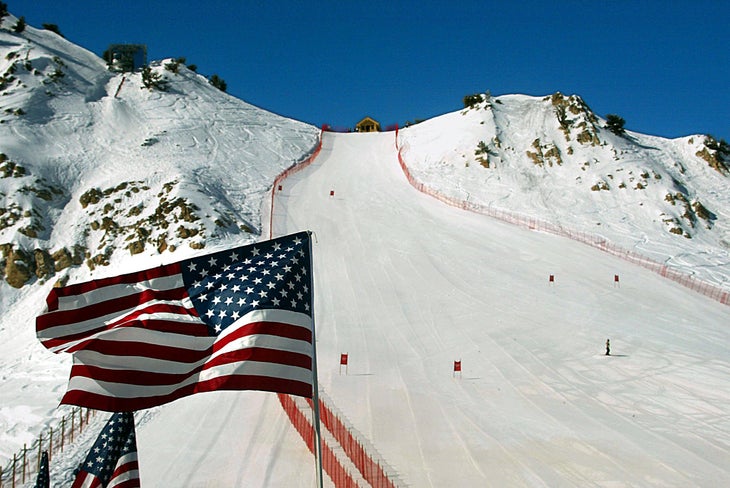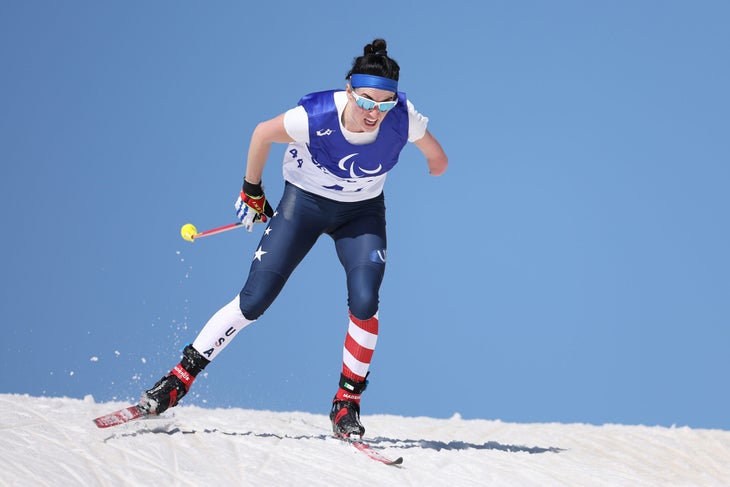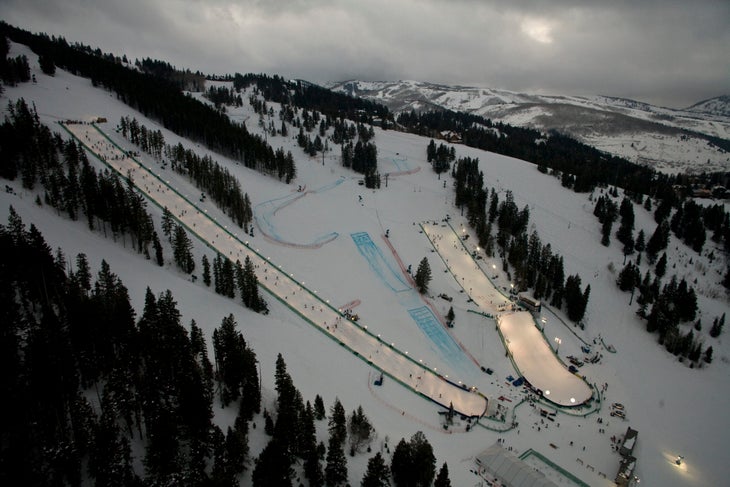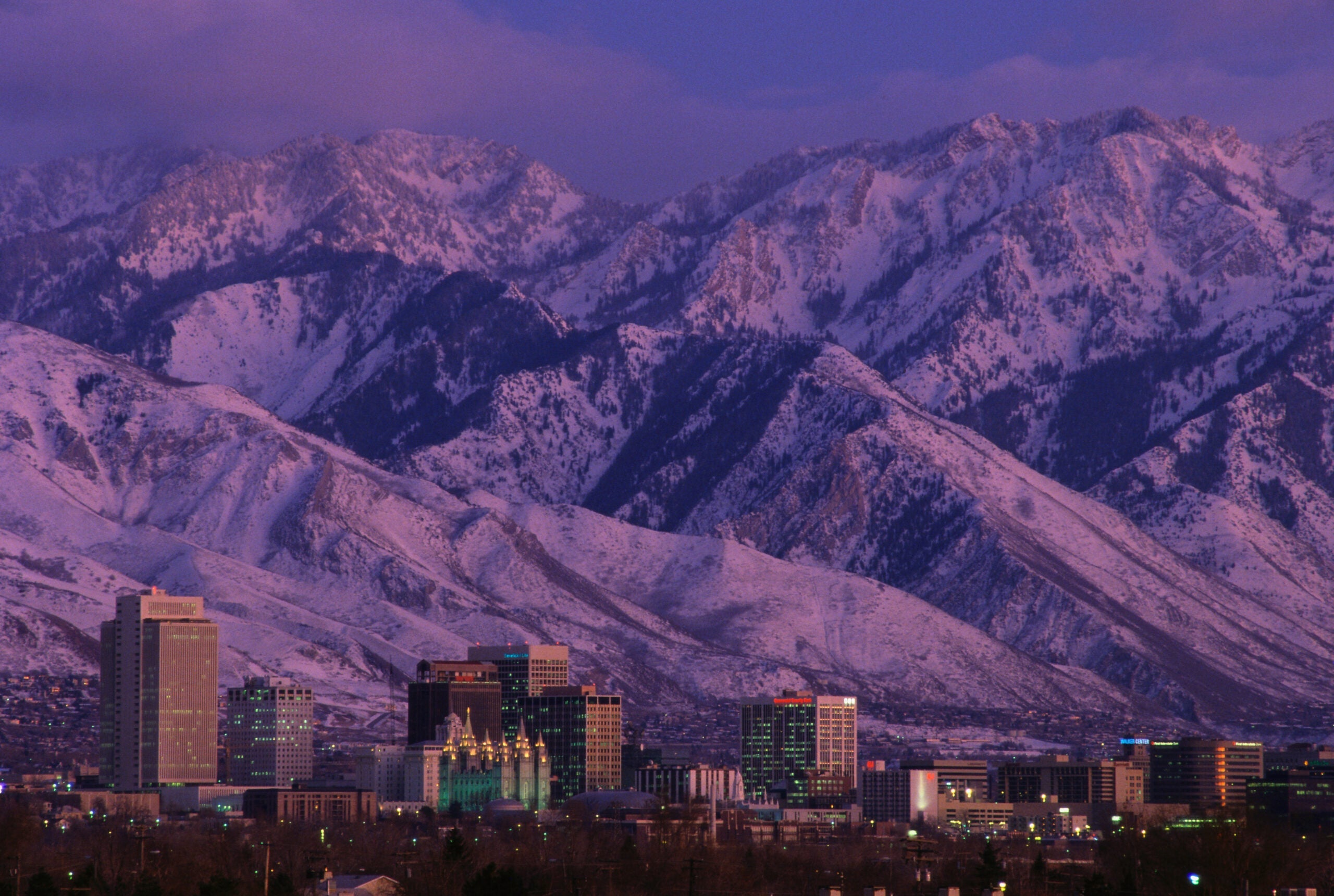This past April, International Olympic Committee member Karl Stoss was in Salt Lake City on a final visit with committee. As he was leaving, Stoss, who chairs the IOC’s Future Host Commission, stopped at an airport help desk to inquire about his departure gate. An enthusiastic airport employee noticed he was with the Olympic movement and gushed, “Bring the Olympics back to Utah!”
And indeed, he did. During the IOC’s 142nd session on July 24 in Paris, Stoss and his fellow IOC members voted to approve Salt Lake City-Utah as host of the XXVII Olympic Winter Games and Paralympic Games 2034.
It will be the second time the Utah capital has hosted the Winter Games in the 21st century—and the fifth time the U.S. has hosted a Winter Olympiad. SLC hosted the 2002 Games, joining Lake Placid (1932 and 1980) and Squaw Valley, now Palisades Tahoe (1960), as U.S. hosts of the Winter Olympic Games.

“This is a great day for winter sport in the United States and around the world,” said Gene Sykes, USOPC Chair, who was part of the bid committee’s presentation in Paris. “The Games vision brought forth by the Salt Lake team—inclusive of state and city leaders, the remarkable bid team, and the community that showed support for this effort throughout—has been collaborative and forward-looking from the very start. We are thankful to the IOC and to Karl Stoss, who led the Future Host Commission, and we look forward to the process of organizing what we know will be a terrific Games in 2034.”
The bid’s major selling point was its popularity (80 percent of Utah residents and 100 percent of the state’s politicians supported the Olympics’ return). All competition venues already exist and have regularly hosted international competitions for the past 22 years. Major upgrades to Salt Lake City International Airport—including a brand-new terminal—also factored in. It is also a chance to extend the legacy that started with the 2002 Winter Games. That legacy includes youth sports programs helping to grow winter sports and producing Olympic and Paralympic hopefuls, including Paralympian Dani Aravich, who is heavily involved with SLC-Utah 2034.
“Even though I grew up with a physical disability, I did not know much about the Paralympics, but everything changed when I began meeting people involved in the 2002 Games,” said Idaho-born Aravich, who competed in track at the 2020 Tokyo Paralympic Games and in cross-country skiing at the 2022 Winter Olympic Games. “Their passion to be in the Olympics and the Paralympics inspired me to pursue a new dream full force.”

The community programming tasked with invigorating our younger generations to pursue winter sports sits in the hands of SLC-Utah 2034 president and CEO Fraser Bullock, who was also the chief operating officer and CFO for Salt Lake City’s 2002 Olympic Winter Games. A planned $260 million legacy budget tied to the 2034 Games will continue support for community sports programs in Utah.
The 2002 Olympic legacy has helped more than just local Utahans, though. Athletes from over 30 countries regularly train at the competition venues built for the 2002 Olympic Winter Games.
“Did it surprise you to learn that athletes from over 30 nations feature in our venues?” Catherine Raney-Norman, board chair of SLC-Utah 2034, posed at the IOC session. “Perhaps some of these athletes are from your countries. We have welcomed them as they help to raise the bar of competitive excellence in sport.”
IOC members lauded SLC-Utah 2034’s compact venue plan. The 13 competition venues are all within an hour of the single Athlete Village, which will be located at the University of Utah. They were also enthusiastic about SLC-Utah 2034’s plan to help athlete families attend the Games.
“We will share access to tickets and transportation accommodations at a fair cost,” said Olympic gold medalist Lindsey Vonn, heading up SLC 2034’s Olympic family planning. “We will create one or more villages for athletes’ families, including one right next to our Olympic and Paralympic Village.” This will be a first for any Olympic games, she noted.
With the IOC approving the 2034 Salt Lake City Olympic Winter Games a decade in advance, the economic boon to the region could be significant. An economic study estimates that the Games will bring $6.6 billion to the region over the next ten years, while the Games are predicted to cost $2.83 billion.
Utah Ski Resorts Return as Ski and Snowboard Venues
Ski resorts that will host 2034 Olympic events are the same as in 2002. While no developments at the resorts are directly related to the 2034 Games, SLC mayor Erin Mendenhall acknowledged that the city will undoubtedly look different a decade from now.
“I am so confident in who we are as a city and as a state ready to welcome the globe back,” Mendenhall . “We keep saying we could host the games right now, but the exciting part is we get 10 years. Not to build facilities, necessarily, but to build our community (and) to help our kids imagine themselves on that podium … It’s an incredibly exciting opportunity.”

Once again, Deer Valley will host freestyle aerials and moguls; Snowbasin will have all of the alpine and para alpine skiing events); and Park City Resort will be home to the freestyle skiing and snowboard halfpipe and slopestyle.
Snowboard parallel racing, skier cross, and snowboardcross will be held at the Utah Olympic Park in Park City.
Anti-Doping Drama Rears Its Head
Today’s announcement wasn’t without a bit of drama. While SLC-Utah 2034’s bid seemed a slam dunk, given that no other city or region bid on the Games and the IOC showed support from the start, a potential roadblock emerged earlier this month.
Several IOC members about 23 Chinese swimmers who were accused of doping before the 2020 Olympic Games in Tokyo. WADA found the swimmers were exposed to the drugs through their food and were not at fault. However, the U.S. case, brought under the , demands more investigation into the event and has been perceived as challenging WADA’s authority.
To calm everyone’s nerves, Salt Lake City-Utah 2034 and USOPC chairman Gene Sykes confirmed in their presentation that both organizations are fully committed to compliance with the World Anti-Doping Code and that their dedication to clean sport and to the coordinated international anti-doping effort led by WADA is absolute.
To ensure that Olympic host cities comply with the World Anti-Doping Code, the IOC amended the host city contract, reinforcing the language to protect the integrity of the anti-doping system and allow the IOC to terminate the Olympic Host Contract in cases where “the supreme authority of the World Anti-Doping Agency in the fight against doping is not fully respected or if the application of the World Anti-Doping Code is hindered or undermined,” read IOC member John Coates, Chair of the IOC’s legal affairs commission.
The State of Utah and the USOPC have fully supported this measure.
“I praise U.S. leadership for wanting to clean up sport,” said Utah Governor Spencer Cox, who is in Paris with the bid committee this week. “And I also praise the IOC and WADA leadership for wanting to clean up sport. They want the same things, and that’s critical.”
Out of 89 valid votes, IOC members cast 83 ‘yes’ votes for Salt Lake City-Utah 2034, 6 ‘no’ votes, and 6 abstentions.


